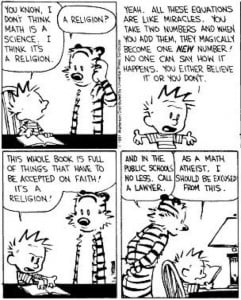Religion is an important, if not central, strand in many American families. We see the traditional set-up all over the place and now that I’m something of a spiritual nomad, I have the privilege of an objective witness to the show.
A Southern Baptists couple, dressed in their Sunday best and King James Bibles cupped in their hands, herding their kids toward the church doors on Sunday morning. Young boys and girls in a masjid during jumah (congregational prayers in Islam) awkwardly imitating the rhythm of prayers and prostrations of salaat. The curious stares of Hindu children at the line of murti (images or statues of the gods/goddesses) in their local Hindu temple during aarti and darshan. The display is identical all over the world.
We’ve all witnessed this phenomena: children are either coldly indifferent or passionately curious about the rituals and practices of their parents. My own daughters found my journey through Project Conversion a deep source of both learning and entertainment. Without appearing too irreverent, to a child, our various religious practices–even the ceremonial clothing we don–may be little more than a session of make-believe or dress-up, yet this doesn’t siphon value from the practice because imitation via imagination is how children learn.
I think the biggest mistake religious/spiritual-minded adults make is assuming that our children should be just as serious and spiritually mature as we are.
Which brings me to something I read in William James’ classic, The Varieties of Religious Experience. Note: if you are a student of psychology, philosophy, or religion in any capacity, this is required reading. As for the average believer, James says,
“His religion has been made for him by others, communicated to him by tradition, determined to fixed forms by imitation, and retained by habit.“–William James
Keep in mind, James was no enemy of faith, just an objective observer. That said, I believe he hits the nail on the proverbial head in his assessment. Given the religious minutia of our daily lives, how much of our beliefs can we truly claim as our own?
According to a Pew Forum study conducted in 2009, %56 of American adults surveyed practice the faith of their childhood. I assume of course, that the faith of their youth is by extension, the religion of their parents. If pressed on the issue, I’m confident that if asked why they believe the way they do, these folks would reduce their religious convictions to, “Well, that’s what my parents taught me to believe.”
We’ve all inherited certain traits from our families. I, for example, have my mother’s eyes, but my father’s build. My wife swears our oldest daughter is my clone–personality and all–despite my fervent objections. On the other hand, my wife heavily favors her father in both appearance and character, which makes for interesting jokes while in the company of my father-in-law.
Our genetics are dictated by our parents, so is it the same with religion? Is spirituality and its specificity something we inherit? Are our parents, in effect, encoding our religious DNA by training us in their faith?
Of course, there is another side to this story. According to the same study, about %44 percent of those surveyed left the faith of their parents, thus ending the spiritual legacy.
And this rupture is growing–especially among younger generations–who claim no affiliation or abandon faith altogether.
If religion is a type of social genetics, are we currently witnessing a sort of evolution…a mutation?
So back to the question: Are you living out your parents’ religion? Why is this question important? Because if you are, it behooves you to examine why you are in the first place. Are you a spiritual genetic clone, going through the same motions as your parents? Perhaps you live in a small town and therefore feel social pressure to conform lest you become an outcast. Maybe you aren’t even sure why you pray or believe in anything at all. Do you believe in a divine being, or the god your parents projected to you?
Maybe you enjoy the spiritual genetic legacy passed on to you, or it could resemble the rat race: something you do because society says you should and because you aren’t privy to an alternative.
But the central question is, can you really say that your faith is your own? If you can honestly answer that question, you’ll be that much closer to “knowing thy self.”


